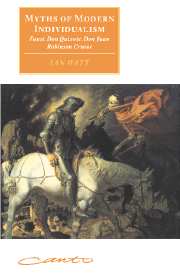Book contents
Thomas Mann's Doctor Faustus
Published online by Cambridge University Press: 24 November 2009
Summary
There are many reasons for choosing Thomas Mann's novel Doctor Faustus (1947) as our first example of a modern version of the myths of individualism. It is, to begin with, an undoubted masterpiece; it raises several basic problems concerning individualism in the modern period; and it represents a newly self-conscious approach to myth – Mann has himself written other, more formal studies of mythology.
As the novel's subtitle – “The Life of the German Composer Adrian Leverkiihn as Told by a Friend” – indicates, there are two main characters. The “friend,” Serenus Zeitblom, is telling the story in the later years of the Second World War, after Adrian's death in 1940.
The equivalent to Faust's compact with the devil (although in this version of the myth it is disassociated from the Mephistopheles figure) occurs in a brothel. Normally chaste and inhibited, Adrian is first enticed there by a diabolic guide; at the third visit, although the woman warns him of the risk, he makes love to her and is infected with syphilis. His evil fate then deprives him of the services of two doctors: Erasmi mysteriously dies, and Zimbalist is arrested. So Adrian gives up the search for a cure; he has always, he says, felt that he was “born for hell” (p. 499). In the final scene, which is the counterpart of the one in the Faustbuch, he tells his friends that “the Evil One hath strengthened his words in good faith through four-and-twenty years and all is finished up till the last” (p. 502).
- Type
- Chapter
- Information
- Myths of Modern IndividualismFaust, Don Quixote, Don Juan, Robinson Crusoe, pp. 245 - 255Publisher: Cambridge University PressPrint publication year: 1996

